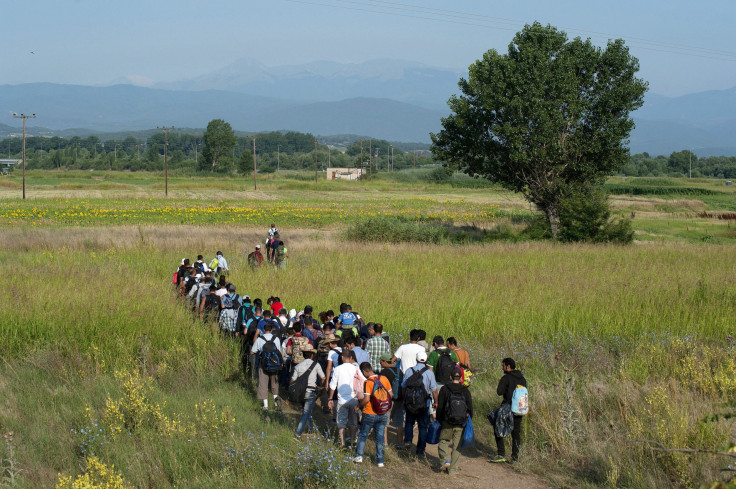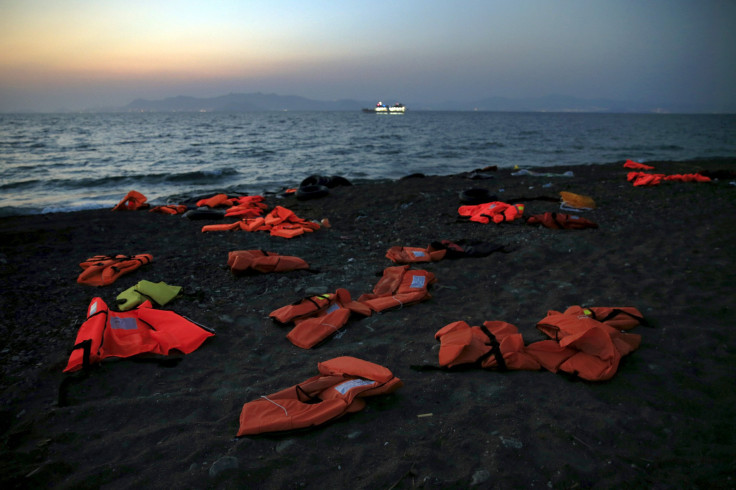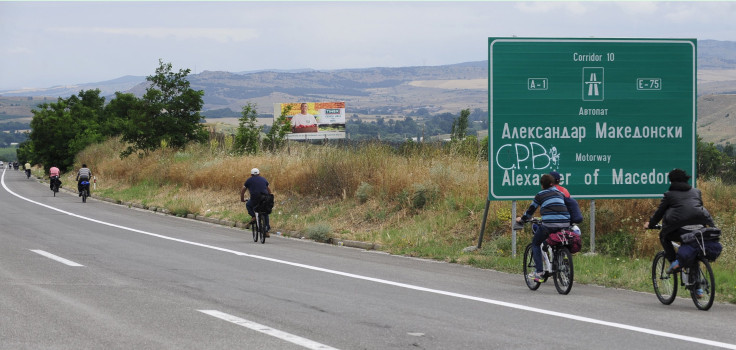Breaking The Law For Love
Billie Minear thought she was doing the right thing, but helping her in-laws find a better life in Europe didn't bring joy — it brought human smuggling charges. That's because her new family members are Syrian refugees.

Billie Minear, a 28-year-old American from small-town Arkansas, stood in the security line at Istanbul’s Atatürk Airport beside her Syrian sister-in-law, not knowing if they would make it past passport control. Minear had married a man from Damascus the year before, and now she was trying to help her new family find a better life in Europe — except helping her family meant breaking the law.
Without the necessary papers or passport, Minear’s sister-in-law had little hope of entering the European Union, where she would be able to legally claim asylum as a Syrian refugee. Her only glimmer of opportunity was using a borrowed passport belonging to someone else and walking through border control with Minear, her American relative with a U.S. passport that probably wouldn’t raise suspicions. So Minear shuffled forward in the airport security line, eager to help her family even as she put her own future at risk.
It wasn’t until months later that Minear was forced to face the consequences of her actions. For helping her relatives travel to Europe, Minear had become an internationally wanted person under investigation for human smuggling. If found guilty, she faces up to four years in prison, a massive fine and a criminal record that would limit her ability to travel the world.
"It is a very strange situation she has been put in,” said Tomasz Kodrzycki, a human rights lawyer in Amsterdam representing Minear's case in the Netherlands court system. “She was in no way thinking she was committing any kind of crime. She felt that she was doing the right thing helping her family members coming from a war zone.”
Across Europe, lawmakers are grappling with an ever-growing migrant crisis that has sent floods of refugees from Syria and other war-torn nations to its shores, demanding shelter and asylum. In Greece, 107,000 migrants have arrived in the country so far this year, according to United Nations Refugee Agency estimates. In Italy, there have been more than 50,000 foreigners seeking assistance. In all, about 160,000 migrants have crossed into Europe since January, adding more pressure to a struggling European Union economy. But it is not just governments that are trying to find a solution to the migrant crisis. Families in Europe with relatives fleeing countries ravaged by war are also confronting difficult choices.

From Arkansas To Istanbul
Human smuggling is defined as the facilitation, transportation, attempted transportation or illegal entry of one person or several people across an international border, according to the U.S. State Department. It differs from human trafficking in that it does not have to involve financial gain or material benefit. Trafficked or smuggled migrants to Europe generally follow well-traveled paths across the Mediterranean and through the Balkans, Eastern Europe and Turkey.
After helping both of her husband’s sisters enter the European Union with borrowed passports, Minear has become the first American to be charged with human smuggling of Syrians into the Netherlands. She is awaiting trial in Amsterdam on charges of smuggling two Syrians and arranging their illegal entrance by giving them “look-alike” passports, or passports that belong to someone else but that showed similarity to the individuals, according to the public prosecutor’s office in North Holland. The prosecutor said in an email to International Business Times that Minear is also thought to have arranged the tickets for the two individuals and escorted them to the Netherlands. The prosecutor’s office declined to provide court documents to IBTimes.
Nothing in Minear's background suggested she would one day end up in a holding pen in Iasmos Border Guard Station, a Greek detention center better known for housing migrants fleeing conflict zones in the Middle East and North Africa. Her upbringing was ordinary in almost every way. She is the product of a close-knit, nuclear family from Bentonville, a city best known as the headquarters of Walmart.
Despite her small-town origins, Minear's dream was to see the world. She had only traveled outside the U.S. to visit Mexico, but that changed three years ago when Minear decided to swap the sprawling fields of Arkansas for the Byzantine towers of Istanbul -- a city that straddles East and West, Asia and Europe. Living in the Turkish capital would let her explore both worlds.
Minear quickly settled in, finding a job with a local preschool and immersing herself in everything Istanbul had to offer -- nights out on the Bosphorus, museums and ancient ruins by day, plus a constant supply of new tastes and flavors at the never-ending strip of restaurants on Istiklal Street.
She met a man, Marwan, a native of Damascus, who had fled the war in neighboring Syria and was living in Turkey as a freelance journalist and translator. (This writer met Minear on several occasions through Marwan, who translated for her on the border of Turkey and Syria.)
Marwan was unlike anyone Minear had met back home. He was sensitive and thoughtful about his life, and wanted to help his family more than he wanted to help himself.
For three years, as Marwan worked tirelessly to get his extended family out of Syria, the couple shared a home with Marwan’s two sisters in Istanbul. Minear was close with her new family, especially Marwan’s sisters. They shopped, cooked, studied and talked about life plans, including the hope that one day they would all live in Europe. But Minear's sisters did not have the same freedom to travel that Minear did. They were, in many ways, bound to Istanbul.
Marwan soon saved enough money to travel to Europe and request asylum status in Sweden. He and Minear married months later in Barcelona as the city celebrated the Christmas season. During the ceremony, Minear saw what seemed like dozens of people dressed up like Santa Claus walking nearby. The holiday cheer reminded her of home.
As time went on and the Turkish government began to crack down on protesters and ban certain social media sites, Minear's new sisters became increasingly unhappy in Istanbul. They wanted to leave Turkey and enroll in college in Europe.
“I said, ‘I hate that they made you do this and put you through this,' But she said, ‘No, no, Mom, I am a big girl. Nobody made me do it.’ That is the funny thing about Billie, she finds the good in everything. She finds the good in everyone.”
It was a seemingly impossible proposal. Obtaining the legal paperwork to travel can be difficult for Syrians. Millions of the country’s refugees have no choice but to remain in refugee camps on Syria’s border, unable to leave unless they buy into a dangerous smuggling network with people they do not know.
“These people are escaping the conflict and ultimately in reality they are pushed into engaging with smugglers and traffickers,” said Itayi Viriri, a spokesman from the International Organization for Migration. “In many instances they use whatever means at their disposal to travel, walking or getting on any mode of transport that they can.”
But Minear, with her U.S. citizenship and limited knowledge of international immigration policy, didn’t see why her sisters couldn’t seek a new life outside of Turkey. Only months after becoming a wife, Minear was making plans to smuggle her in-laws across Europe’s borders.
A Desperate Situation
Since Europe’s migrant crisis began earlier this year, hundreds of migrants have drowned in the Mediterranean on their way from Libya to Europe by boat, and refugees have flooded towns and villages in Greece as they traveled through Balkan states to claim asylum. European lawmakers have responded by embracing anti-immigrant rhetoric, including promises to build walls to keep foreigners out, and launching an unprecedented crackdown on human trafficking.
“If there is more coordination among EU states in terms of burden sharing, we wouldn’t have the kind of situation we are in now,” said Viriri. “Hungary said point blank, we are not going to take any of these quotas.”
In the Netherlands, about 28,000 refugees submitted asylum applications in the first part of 2014, an increase of three-quarters from the same period two years ago. Syrians are one of the largest population groups to apply for asylum in the country.
“Immigration is a hot topic in the Netherlands,” said Kodrzycki. “They are very strict about it and now the Dutch courts are getting involved.”
Like other European Union economies, seven years of austerity and a faltering euro have taken a toll on Dutch society. In the first quarter of this year, 298,000 people were unemployed for a year or longer, about a 21 percent increase from the same period last year, The Netherlands Times reported.
Prime Minister Mark Rutte’s Liberal Party recently produced a seven-page position paper suggesting that it was time for Europe to close its borders to refugees and asylum-seekers. “The European migration system cannot be sustained and forms a major risk to our security,” Liberal MP Malik Azmani said in the report.
But Minear never imagined she was contributing to Europe’s migrant woes. She simply wanted to help her family.
Minear accompanied her sisters-in-law on two occasions on flights from Istanbul to the Netherlands and helped them secure borrowed passports for the trip. She said she did not receive any financial gain.
In an interview while seeking asylum, one of Minear's sisters-in-law mentioned her name to authorities and her involvement in her journey to the Netherlands. Dutch security officials soon put out a European-wide warrant for Minear's arrest.
For Minear's family in the Arkansas, it seemed as if she had put her in-laws safety ahead of her own.
“I told her, I said, ‘I hate that they made you do this and put you through this,’” recalled Linda Baskin, Minear's mother, referring to Marwan and his sisters. ”But she said, ‘No, no, Mom, I am a big girl. Nobody made me do it.’ That is the funny thing about Minear, she finds the good in everything. She finds the good in everyone.”
Regrets And Detention
Minear was arrested July 9 while traveling by bus to visit a friend in Albania on the main highway out of Istanbul that rolls through the hilly landscape of Turkey’s western territory.
When the bus passed through the Greek border crossing, police officers pulled Minear aside and indicated that something was wrong with her passport. They told her there was a warrant out for her arrest and said they needed to detain her because she’d been accused of human trafficking.
“I said, wow, human trafficking. That’s one for the resume,” Minear recalled with a laugh.
Minear was arrested by Greek police and detained on charges trafficking Syrians to Europe -- charges that were later reduced to human smuggling.
“I regret getting on that bus.”
Her first night in detention, Minear slept on a couch in the police station. She was then transferred to Lasmos Border Guard Station, where a filthy mattress in a cell with other migrants became her temporary home. There were no toilets, or showers, and very little food. At one point, they locked her in solitude for three days.
“I think they just didn’t know where else to put me,” Minear said.
Over time she was moved among six different holding stations in two countries and held in solitary confinement for six days. The U.S. consular services visited Minear in Greece and provided her with reading material. The State Department confirmed Billie’s detention in an email statement to IBTimes.
Following her two-week detention in Greece, Minear was moved to the Netherlands and returned to solitary confinement. She worried about what would come next, whether she would be feed, how much time she would have to serve and whether she would see her mother again. She hoped the courts in Amsterdam would understand that when she accompanied two Syrian women on flights to Europe, she was only trying to protect her family.
Dutch authorities interrogated Minear twice. In the first interrogation session they asked her personal questions, which she answered. The second day of interrogation was about the case, she said, and she chose to remain silent.
The court let Minear out of pretrial detainment on Aug. 4. By then, her husband and his sisters were all living together in Amsterdam. Marwan’s sisters had been granted full asylum status and one of the women was attending a prestigious art school in Amsterdam.

An Unclear Future
Minear went home to her husband and his sisters in Amsterdam while she waited for her trial to begin. Until then, she has to check in with the Dutch authorities once a week -- the police have her travel documents and will also be tracking her internet conversations.
She spent her first day out of pretrial detention with Marwan and his sisters. They visited a park, where one of her in-laws rolled down a hill and beamed with happiness.
“Being here with them and seeing her [one of the sisters] happy, it was so great,” Minear said.
If convicted, Minear could face up to four years in prison. According to Dutch law, an individual is a suspect until the judge makes a ruling. There is no jury. The public prosecutor sues a person he or she thinks committed a criminal offense. The case is then presented in court, where the prosecution demands a penalty that suits the case. The judge makes the final ruling.
Minear has visited her lawyer twice since being released. She doesn’t know what the trial will bring for her, but she’s hopeful her sentence will be light.
“Freedom is really something that is underrated,” she said. “[But] I really didn’t blame anyone or regret at all what I did.”
© Copyright IBTimes 2024. All rights reserved.




















